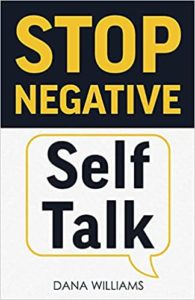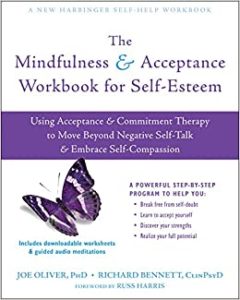Affirm: I will let go of all thoughts and habits that do not serve me. I will not longer participate in limiting my ability to succeed. IAMSASHAJACKSON
Disclaimer: This post contains affiliate links. Should you purchase a product through those links, I may earn a small commission at no additional cost to you. I stand behind all the products I promote.
In our quest to find a happier, more fulfilling, and abundant life, it is paramount to get rid of certain toxic habits. We all have behaviors that are counterproductive and ultimately very damaging. These habits become obstacles on the way to success, wellbeing, and peace of mind. Changing habits is easier said than done; it requires effort and willingness, but like everything else, it’s doable.
This post will cover all you need to know about negative self-talk. I will offer information about what this notion means and the toxic effects this habit can have on your body, mind, life, and loved ones. I will also explain how to identify negative self-talk and ultimately how to minimize it, if not combat it. In short, we need to unlearn toxic narratives.
What is negative self-talk?
We all have an inner critic. At times this little voice can actually be helpful and keep us motivated towards goals. However, this voice can often be more harmful, particularly when it gets into the realm of excessive negativity. This is known as negative self-talk, and it can really bring us down. It also creates significant stress, not only to us but to those around us if we’re not careful.
Basically, negative stress is an inner dialogue you have with yourself that may be limiting your ability to believe in yourself and your own skills to reach your full potential. It is any thought that diminishes your capacity to make positive changes in your life or your confidence to do so; negative self-talk can really stunt your success. Some examples of this inner dialogue are, “I am not good at this, so I should avoid attempting for my own personal safety,” or “I can never do anything right.”
Stop negative self-talk

Studies suggest that how we speak to ourselves has a powerful impact on our mental and physical health, including weight control, managing stress, and improving sports and academic performance.
Thinking negatively about yourself could seriously interfere with work/study and everyday functioning. This inner dialogue tends to arrive with a negative bias. Giving this chatter too much influence can impact our confidence, self-esteem, and productivity.
We can be terrible at assessing our reality, and we are often much harsher at judging ourselves than we would be our peers, often referred to as negative self-talk.
Quoting Kaki Okumura in his article Circling back to yourself is a powerful form of self-care, “We’re all heard the old adage- comparison is the thief of joy-but just because we know it’s true doesn’t mean that we are impervious to it. Humans are naturally wired to compare and compete, and we often do it against the people who we determine to be in better standing than us, whether this is physically, financially, or socially.”
I think the previous quote gives us a better idea of where negative self-talk comes from. I also believe that we should not be too hard on ourselves and treat our fears and concerns similarly to if we were giving advice to a friend or loved one with compassion, kindness, and understanding.
The way we communicate with ourselves plays a significant role in how we see and experience the world around us. That’s why being mindful of these very delicate words we tell ourselves regularly is extremely important.
According to Okumura, “when we circle back to ourselves, we are training to look past the opinions of others and build the self-confidence to judge ourselves with both high standards and self-compassion.”
The mindful and acceptance workbook for self-esteem

Consequences of Negative Self-Talk
Negative self-talk can affect us in some pretty damaging ways. One study found that rumination and self-blame over adverse events increased the risk of mental health problems.
Negative inner dialogue can lead to a lowered ability to see opportunities and a decreased tendency to capitalize on these opportunities.
Focusing on negative thoughts may lead to decreased motivation as well as greater feelings of helplessness. This type of critical inner dialogue has also been linked to depression, so it’s definitely something to fix. Furthermore, those who find themselves frequently engaging in negative self-talk tend to be more stressed.
Other consequences of negative self-criticism can include:
- Limited thinking. The more you tell yourself you can’t do something, the more you believe it.
- Perfectionism. You begin to believe perfection is attainable.
- Feelings of depression. If left unchecked, this fact could be pretty damaging.
- Relationship challenges. Whether the constant self-criticism makes you seem needy and insecure, or you turn your negative self-talk into more general negative habits that bother others.
This damaging habit is a vicious circle that needs to stop. Self-criticism is not a positive trait. Conversely, research has shown that positive self-talk is a great predictor of success. Self-talk can be either positive or negative. We either talk ourselves into believing that something can’t be done, or we can talk ourselves into believing we can accomplish our goal. Ultimately it’s up to us.
Identifying Negative Thinking
Some common forms of negative self-talk include:
- Filtering.
You magnify the negative aspects of a situation and filter out all the positive ones.
- Personalizing.
When something bad occurs, you automatically blame yourself.
- Catastrophizing.
You automatically anticipate the worst.
- Polarizing.
You see things as either good or bad. There is no middle ground.
There are strategies to either minimize, combat, or stop negative self-talk. Each woman is different and should apply the techniques that work for them. I will be presenting several ways to address this damaging habit so we can become more confident and ultimately free ourselves.
How to minimize negative self-talk
There are many ways to reduce that hostile inner critic in your daily life. Try a few on and see which ones are most effective for you.
- Catch your critic. Learn to notice when you are being self-critical so you can begin to stop.
- Contain your negativity. This puts a limit on how much negativity can come from the situation.
- Change negativity to neutrality. When your self-talk uses more gentle language, much of its negative power is muted as well.
- Think like a friend. Often we’ll say things to ourselves in our heads that we’d never say to a friend. When you catch yourself speaking negatively in your head, make it a point to imagine yourself saying this to a beloved friend.
- Shift your perspective. Sometimes looking at things in the long term can help you realize that you may be placing too great an emphasis on something.
- Say it out loud.
- Stop that thought. Simply stopping negative thoughts in their tracks can be helpful.
- Replace the bad with the good. This is one of the best routes to combating negative self-talk. Replace it with something better. Take a negative thought and change it to something encouraging that’s also accurate.
So, how do we focus on positive thinking?
Says Dana Sparks in her article Mindfulness: Overcoming negative self-talk, “Some studies show that personality traits such as optimism and pessimism can affect many areas of your health and wellbeing. The positive thinking that usually comes with optimism is a key part of effective stress management. And effective stress management is associated with many health benefits. If you tend to be pessimistic, don’t despair; you can learn positive thinking skills.”
We all know that adopting new habits and getting rid of old bad habits is easier said than done; however, it is doable. You can learn to turn negative thinking into positive thinking. The process is simple, but it takes time and practice.
Here are some ways to think and behave more positively and optimistically:
- Identify areas to change.
- Check yourself periodically during the day, stop and evaluate what you are thinking.
- Be open to humor (the ultimate lifesaver).
- When you can laugh at life, you feel less stressed.
- Follow a healthy lifestyle (this is the key to everything).
- Surround yourself with positive people. If you haven’t done it already, detox your life by getting rid of negative people.
- Practice positive self-talk:
Follow one simple rule. Don’t say anything to yourself that you wouldn’t say to anyone else.
Can you STOP negative self-talk?
If done right, it can be possible; those loud thoughts coming from our inner voice are not the issue. It’s the weight we give them, how we choose to engage with them, that get in our way.
Our thoughts and feelings are just that, thoughts and feelings, and they do not need to dictate our moods or behavior. True self-esteem comes from changing our relationship with our thoughts rather than overriding negative thoughts with more positive ones.
One effective tool to combat negative thinking is meditation. We get to shift perspective and not let our feelings and thoughts define us through training the mind. Meditation will help to find a new perspective that allows us to let go of our inner critic.
Final tips to stop negative self-talk
- See yourself more accurately.
- Focus on your good traits.
- Know what to blame on your mood.
- Ask yourself what you care about.
- Understand your inner critic has good intentions.
- Learn to accept-not love-your flaws.
- Recognize your accomplishments.
- Address your vulnerabilities.
The takeaway
If you tend to have a negative outlook, don’t expect to become an optimist overnight. But with practice, eventually, your self-talk will contain less self-criticism and more self-acceptance. You may also become less critical of the world around you.
When your state of mind is generally optimistic, you can better handle everyday stress more constructively. That ability contributes to the widely observed health benefits of positive thinking.
It is all about connecting the dots. If you are willing to change detrimental habits, you can do it. Again, it takes determination and willpower, but I assure you, it is worth it.

